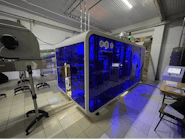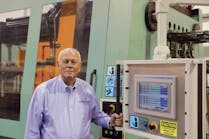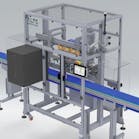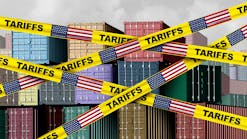By Bruce Geiselman
Blow molding machine manufacturer FlexBlow, based in Lithuania, a former Soviet republic, is operating as normal following the Russian invasion of Ukraine but is looking to pivot its business strategy.
Lithuania, a member of NATO, is north of Belarus and does not border Russia or Ukraine, so it isn’t near the fighting. However, the company plans on changing its sales strategy in the wake of the conflict and possible economic fallout.
“Yes, we see a concern, which is going both from East and from West regarding our business,” Gintautas Maksvytis, FlexBlow CEO, said.
About 7 percent of FlexBlow’s sales by value went to Russia last year, “and the primary concern there is about the future,” he said.
Read more about how the Russia-Ukraine conflict is affecting businesses.
In the near term, customers in Russia have expressed confidence that they will go forward with equipment ordered from FlexBlow, pay for it and pick it up. However, FlexBlow is concerned that a potential economic crisis in Russia would limit the ability of companies there to purchase new equipment. Western nations have promised tough economic sanctions against Russia.
FlexBlow didn’t have any current customers in Ukraine, but was working with some prospective customers. That business is now considered lost, Maksvytis said.
For those reasons, as a precaution, FlexBlow will shift sales efforts that it had directed toward Russia to new markets, including Latin America and the Middle East.
Eighty percent of FlexBlow’s sales are to Western Europe and North America.
“I think we are lucky in that aspect,” Maksvytis said. “Plans from Western Europe and North America seem to be unchanged.”
Maksvytis also thinks energy prices will go up “significantly.”
As FlexBlow shifts some of its sales to less-developed countries, the company may introduce some new equipment designed for those areas.
“We are going to put more energy into serving other, let’s say, medium- and the low-income markets,” Maksvytis said. “The costs are rising, and we are going to, let’s say, sell our capacity to the lower-income countries, which inevitably means that we will have to do specific versions of products so that we can penetrate in these distant and low-cost markets. We are thinking of an economy version of our products for these new markets. We have already confirmed our participation in Pack Expo Mexico [Expo Pack Mexico], and this is going to be our first time exhibiting in Latin America. This is partially related to what’s happening in Russia.”
FlexBlow initially planned to attend an exhibition in Moscow but has decided to swap out that trade show for the one in Mexico, he said.
In the meantime, Maksvytis said he has been hearing words of support from customers and partners in the West.
“There is a very strong support, and this is unexpected,” he said. “People, partners from the West, are calling and sending their regards, which is very nice of them.”
Maksvytis doesn’t expect any problem obtaining parts to continue building blow molding machines. FlexBlow doesn’t rely on parts from Ukraine or Russia, and the company, because of precautions taken during the pandemic, has a three-month inventory of parts, he said.
Maksvytis said he also wanted to reassure customers, many of whom are based far from Europe, that Lithuania is not a neighbor of Ukraine or Russia, and that its equipment will not be shipped through Ukraine. He expressed confidence that the conflict would not spread to Lithuania because it is a member of NATO.
Maksvytis said he expects refugees will flee from Ukraine to the West and that as the economy suffers in Russia, talented workers will be seeking opportunities elsewhere, which could help with talent recruitment.
“To the European manufacturers, there is also an opportunity, all of a sudden, to offer opportunities for technical talent, which is scarce everywhere,” he said.
Contact information:
FlexBlow, Kretinga, Lithuania, 424-422-5099, https://flexblow.com/
More on the war in Ukraine
Check out our additional coverage on the war in Ukraine and how it's affecting the plastics industry:
Volatility in the oil market could push resin prices higher.
3D printing companies suspend business in Russia.
Endeavor Business Media examines the effects on business from multiple angles.
Bruce Geiselman | Senior Staff Reporter
Senior Staff Reporter Bruce Geiselman covers extrusion, blow molding, additive manufacturing, automation and end markets including automotive and packaging. He also writes features, including In Other Words and Problem Solved, for Plastics Machinery & Manufacturing, Plastics Recycling and The Journal of Blow Molding. He has extensive experience in daily and magazine journalism.






